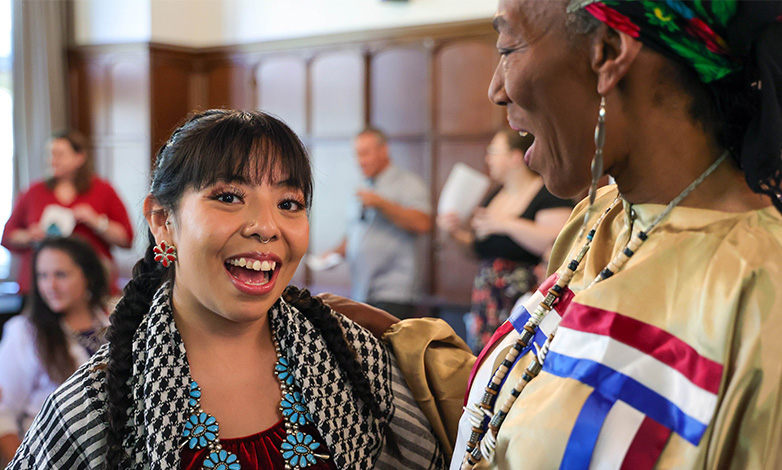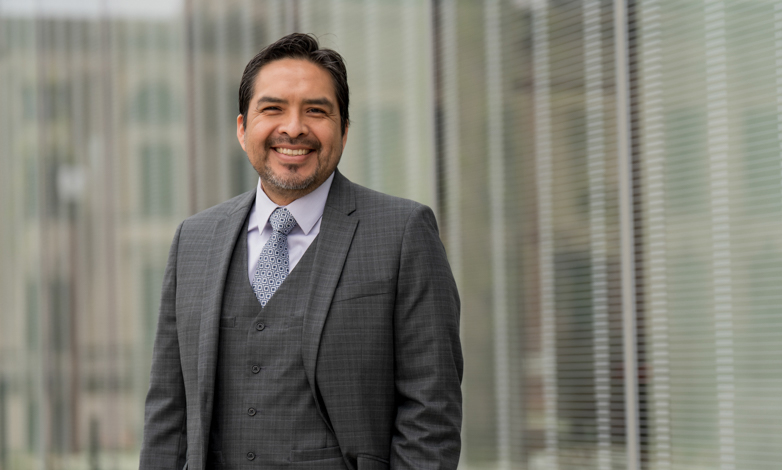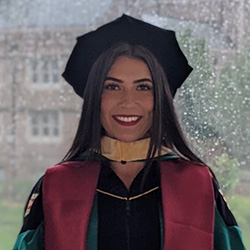American Indian and Alaska Native Concentration
The American Indian and Alaska Native (AI/AN) curriculum grounds students in the historical and contemporary issues facing Native populations from cultural, policy and practice perspectives.
Students study with renowned evidence-based practitioners and leaders in the field, including Brown School faculty affiliated with the Kathryn M. Buder Center for American Indian Studies, regarded as one of the nation’s preeminent centers for academic advancement and study of Native American issues related to social work.
Graduates develop the knowledge and skills to serve Native communities and individuals to: understand the extent, effects and causes of issues facing Native Peoples; gain awareness of tribal governance and institutions; and learn best practices for evaluating and intervening with communities. A special emphasis is placed on cultural responsiveness utilizing a strengths-based perspective.
The concentration has three tracks to choose from:
Direct Practice – Trauma Informed Track
for students who plan to work with AI/AN communities coping with trauma through a direct practice lens
Direct Practice – Behavioral Health Track
for students who plan to work with AI/AN communities experiencing mental health and substance abuse conditions through a direct practice lens
Community Track: for students who plan to work in community building, capacity development, leadership and asset building in AI/AN tribes and communities
Curriculum requirements are detailed below.

Career Paths
Recent graduates have been employed in organizations such as:
- Tribal, State & Local governments
- Indian Health Services
- Community-based organizations serving AI/AN Peoples
- Urban and rural health clinics
- Tribal schools and colleges
- Elder – Gerontology
- Residential Treatment
- Veterans Services
- Criminal Justice
- Social Services
Concentration Requirements: 15 Credits
- Indigenous Knowledge, Values, and Cultures (3 credits)
- American Indian Social Welfare Policies & Administrative Practices (3 credits)
- Indigenous Mental Health Practice (3 credits)
- Community Development with American Indian and Other Indigenous Communities (3 credits)
- One additional practice-focused course, to be determined based on your track of choice (3 credits)
You will also complete a leadership and management course, an evaluation course, and 9 credits of elective courses. These elective credits can be used to broaden your expertise in other areas or to pursue additional AI/AN-related elective courses.
Concentration Practicum
The MSW program requires 600 hours of concentration practicum (in addition to 360 hours of foundation practicum). The concentration practicum must take place in an AI/AN-related setting.
Sample AI/AN practicum sites include:
- American Indian Community Housing Organization (Duluth, MN)
- Cahokia Mounds (Collinsville, IL)
- Cherokee Elder Care/PACE (Tahlequah, OK)
- Denver Indian Family Resource Center (Denver, CO)
- Haskell Indian Nations University (Lawrence, KS)
- Indian Health Services Behavioral Health (Various locations)
- Prairie Band Potawatomi Nation Social Services (Mayetta, KS)
- Intertribal Council of Arizona (Phoenix, AZ)
- Minnesota Indian Women’s Resource Center (Minneapolis, MN)
- National Council for Urban Indian Health (Washington, D.C.)
- National Indian Child Welfare Association (Portland, OR)
- National Native Children’s Trauma Center (Missoula, MT)
- Navajo Nation Division of Social Services (Window Rock, AZ)
- Saint Regis Mohawk tribe Health Services
- Tuscarora Behavioral Health
- American Indian Health services of Chicago
- Urban Indigenous Collective NYC
Concentration Chair

Manasseh C. Begay, LCSW, LADAC, serves as program manager for Social Workers Advancing through Grounded Education (SAGE). The program recruits, trains and financially supports Brown School MSW students who are interested in completing three credits of their practica in Indian Country and is facilitated by the Buder Center for American Indian Studies. He works collaboratively with the Office of Field Education.


“As a Native woman, it was important for me to pursue a degree that I could utilize to advocate for whichever tribal community I work within. Gaining a dual degree in social work and public health allowed me to gain knowledge on systemic issues while also providing me with the tools to problem-solve towards potential solutions. I am also very grateful for the American Indian and Alaska Native Concentration because it provided extremely important and relevant community-level applications that I will utilize in my future work in Indian Country.”
Kaleigh Edwards, MSW/MPH ’23
Tutčint Program Coordinator, Pukúu Cultural Community Services in San Fernando, CA